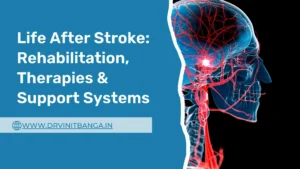When it comes to your brain and nervous system, paying attention to early symptoms can make a big difference. Many people ignore warning signs, such as headaches, dizziness, numbness, or memory issues, assuming they will go away on their own. However, these could be early indicators of neurological conditions that need medical attention. In this blog, I, Dr. Vinit Banga, explain the top five reasons you should visit a neurologist and how timely care can prevent serious complications.
As the Best Neurologist in Faridabad, I have seen firsthand how early diagnosis and personalized treatment improve patients’ quality of life. Let’s explore the key reasons why visiting a neurologist is essential for your health.

Why You Should Visit a Neurologist
1. Frequent or Severe Headaches
Headaches are one of the most common reasons patients visit a neurologist. While occasional headaches may result from stress, dehydration, or lack of sleep, recurring or severe headaches might signal something more serious.
If you experience migraines, cluster headaches, or tension-type headaches frequently, it’s time to seek professional help. Neurologists use advanced diagnostic tools to identify the underlying cause, whether it’s nerve irritation, hormonal imbalance, or neurological dysfunction.
I often see patients who struggle for years with undiagnosed migraines or tension headaches. After a thorough evaluation, we can create personalized treatment plans that incorporate medication, lifestyle modifications, and preventive therapies. Don’t wait until the pain becomes unbearable—you should visit a neurologist when headaches start interfering with your daily life.
Common signs that your headache needs attention:
- Pain that worsens with movement or light exposure
- Sudden, severe headache (“worst headache of your life”)
- Nausea, vomiting, or vision disturbances
- Headaches that wake you up at night
- Headaches after a head injury
2. Persistent Dizziness, Numbness, or Tingling
If you frequently feel dizzy, lightheaded, or experience numbness or tingling in your arms, legs, or face, these could be signs of nerve or brain dysfunction. These symptoms may result from issues like peripheral neuropathy, multiple sclerosis, or even early signs of a stroke.
A neurologist can perform nerve conduction studies, MRI scans, and neurological examinations to determine the cause. Identifying the root of the problem early ensures faster recovery and prevents irreversible damage.
At my clinic, I emphasize patient education—understanding the reason behind these sensations helps patients take control of their health. If your hands or feet feel “asleep” too often or you lose balance easily, you should visit a neurologist without delay.
3. Memory Loss or Cognitive Decline
Occasional forgetfulness is common, especially during stress or lack of sleep. However, if you find yourself forgetting names, misplacing things frequently, or having trouble concentrating, these may be signs of cognitive impairment.
As we age, conditions like Alzheimer’s disease, dementia, or mild cognitive impairment become more likely. Neurologists specialize in diagnosing and managing these disorders through cognitive assessments and brain imaging.
In my practice, I encourage families to bring elderly loved ones for early screening. The earlier we detect memory issues, the better we can manage symptoms and slow progression. Even younger individuals may experience attention or memory difficulties due to sleep disorders, depression, or vitamin deficiencies.
If you notice persistent memory changes, confusion, or difficulty following conversations, it’s time to consult a specialist. Early intervention can preserve brain function and improve quality of life.
4. Uncontrolled Muscle Weakness or Tremors
Weakness, involuntary movements, or tremors are common symptoms of neurological disorders like Parkinson’s disease, multiple sclerosis, or motor neuron disease. Ignoring these early warning signs can lead to loss of muscle coordination or difficulty performing daily tasks.
A neurologist can identify whether the cause is nerve-related, muscular, or due to central nervous system dysfunction. At my center, we use electromyography (EMG) and other diagnostic tools to evaluate muscle health and nerve activity.
Patients often come in believing their tremors are simply due to fatigue or aging. However, after detailed evaluation, we sometimes uncover treatable causes. Physical therapy, medications, and rehabilitation can restore strength and coordination in many cases.
If you notice your hands shaking, legs feeling heavy, or difficulty with balance, remember—you should visit a neurologist before the condition worsens.
5. Seizures or Unexplained Fainting Episodes
Experiencing a seizure, blackout, or unexplained loss of consciousness is a clear signal to seek neurological care. Seizures may result from epilepsy, infections, brain injury, or metabolic imbalances.
Neurologists are trained to identify the type and cause of seizures through EEG (electroencephalogram) tests and imaging scans. Proper diagnosis helps create an effective treatment plan to prevent future episodes.
In my clinical experience, I’ve seen patients regain full control of their lives after receiving appropriate medication and therapy. Even if it’s your first seizure or fainting episode, consulting a neurologist ensures peace of mind and safety.
Remember, you should visit a neurologist immediately if you experience:
- Repeated fainting or blackouts
- Sudden jerking movements or confusion
- Memory gaps after an episode
- Loss of bladder control during unconsciousness
How the Best Neurologist in Faridabad Can Help You
As the Best Neurologist in Faridabad, my mission is to provide compassionate, evidence-based care for all types of neurological disorders. Every patient is unique, and so is their treatment plan.
At my clinic, we focus on:
- Early diagnosis using advanced neuroimaging and tests
- Personalized treatments for migraine, epilepsy, stroke, and neuropathy
- Holistic care involving diet, stress management, and physiotherapy
- Preventive neurology to reduce the recurrence of neurological symptoms
My goal is not just to treat symptoms but to help patients understand their condition, manage it confidently, and maintain an active, fulfilling life.
If you’re in or around Faridabad and experience any of the symptoms mentioned above, don’t hesitate—you should visit a neurologist for timely diagnosis and care.
Additional Symptoms That Require Neurological Consultation
While the above are the most common reasons, other symptoms also demand medical evaluation:
- Difficulty speaking or slurred speech
- Unsteady gait or frequent falls
- Chronic back pain radiating to the limbs
- Visual disturbances or double vision
- Sudden changes in behavior or personality
These may indicate underlying neurological conditions affecting your brain, spine, or nerves. Addressing them early ensures faster recovery and prevents long-term complications.
Lifestyle and Prevention Tips for Brain and Nerve Health
Visiting a neurologist is important, but maintaining a healthy lifestyle can also prevent many neurological problems. Here are a few simple steps you can take:
- Eat brain-boosting foods: Include omega-3 fats, fruits, vegetables, and whole grains.
- Stay physically active: Exercise improves blood circulation to the brain.
- Sleep well: Poor sleep can worsen headaches, memory, and concentration.
- Manage stress: Chronic stress can affect nerve function and hormone balance.
- Avoid smoking and excessive alcohol: Both increase the risk of stroke and nerve damage.
Remember, prevention is always better than a cure.
Conclusion
Your brain and nervous system control every function in your body—from movement and speech to memory and emotions. Ignoring early warning signs can lead to long-term complications. Whether you’re struggling with headaches, dizziness, weakness, or memory issues, you should visit a neurologist for expert evaluation.
If you are searching for specialized neurological care, the Best Neurologist in Faridabad offers advanced diagnosis, compassionate treatment, and long-term support for patients of all ages. Take charge of your health today—your brain deserves expert attention.
Frequently Asked Questions (FAQs)
1. When should I visit a neurologist?
You should visit a neurologist if you experience frequent headaches, dizziness, numbness, muscle weakness, memory loss, or seizures. Early evaluation helps prevent serious neurological conditions.
2. How does a neurologist diagnose brain and nerve disorders?
A neurologist uses tools like MRI, CT scan, EEG, and nerve conduction tests to detect abnormalities in the brain, spinal cord, and nerves.
3. Can lifestyle changes help improve neurological health?
Yes, balanced nutrition, regular exercise, adequate sleep, and stress control play a major role in maintaining nerve and brain health.
4. Is it necessary to consult a neurologist for migraines?
Absolutely. Migraines are not just severe headaches; they often need specialized diagnosis and treatment that only a neurologist can provide.
5. Where can I find the Best Neurologist in Faridabad?
If you’re in Faridabad, you can visit Dr. Vinit Banga, widely regarded as the Best Neurologist in Faridabad, offering expert care for all types of neurological disorders.






